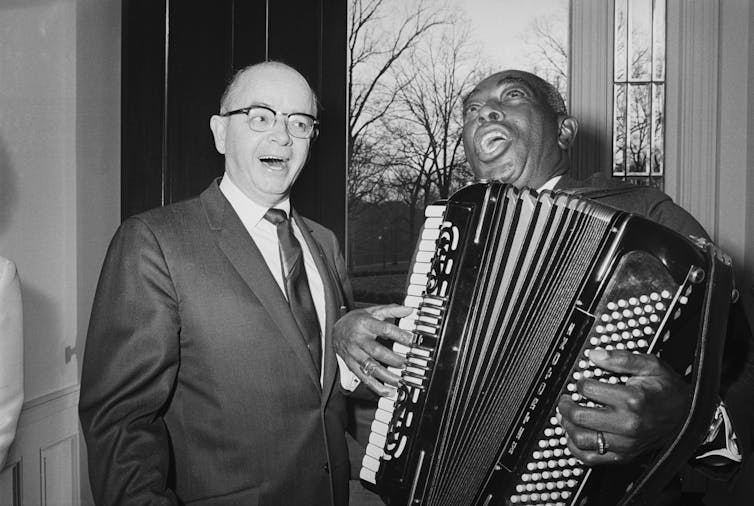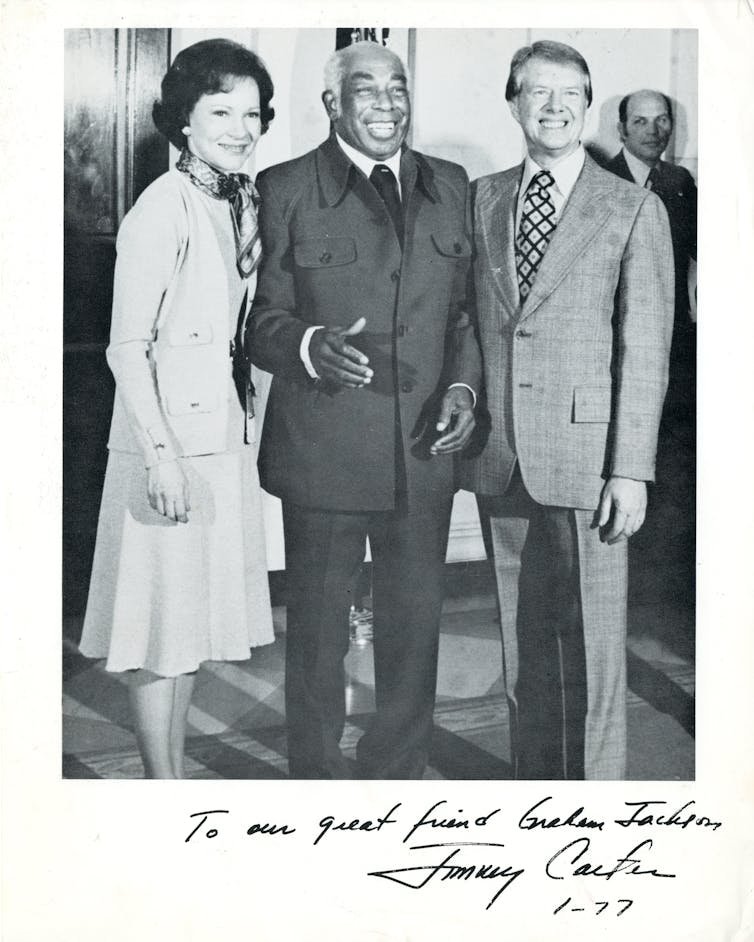The story of Graham Jackson is a timeless tale of American ingenuity, hard work and the cream rising to the top.
It’s also a tale of economic inequality, overt racism and America’s Jim Crow caste system.
As one of the first Black musicians to play on national radio, Jackson is best known for the April 13, 1945, photograph of him that was published by Life magazine, one of the leading publications of its day.
In that image, Jackson, dressed in his U.S. Navy uniform, is seen playing the song “Going Home” on an accordion as the train carrying the body of President Franklin Delano Roosevelt leaves the station in Warm Springs, Georgia, for his burial in Hyde Park, New York.
Jackson’s tear-filled face mourning the death of the nation’s longest-serving president became a symbol of the nation’s grief.
But under legislation that’s been proposed in North Dakota, I am not sure if I can tell the full story of Jackson in one of my college courses without breaking the law.
Officially titled Senate Bill 2247, the measure would criminalize discussing factual history by prohibiting discussions at state universities that involve “divisive concepts.”
The bill defines “divisive concepts” as including white privilege, white guilt, Black resentment or America’s being “fundamentally or irredeemably racist or sexist.”
If passed, the measure would ban any classroom discussions that “an individual, by virtue of the individual’s race or sex, is inherently privileged, racist, sexist, or oppressive, whether consciously or subconsciously.”
It would also ban courses that would make an individual “feel discomfort, guilt, anguish, or another form of psychological distress solely because of the individual’s race or sex.”
As I detail in my biography of Jackson, the story of Graham Jackson involves all of these things.
An orphan with a musical gift
I spent five years researching Jackson’s life, read hundreds of documents and interviewed people who knew him. Through that research, I was able to factually document the racial realities that Jackson and other Black Americans faced throughout the 20th century.
The grandson of enslaved people, Jackson was born into poverty in 1903 and became an orphan. In a twist worthy of Charles Dickens, his mother was committed to Central State Hospital in Virginia after a failed suicide attempt. His father, who had recently lost an arm in a hunting accident, disappeared from his life. He was raised by his aunt.
As an adult, Jackson used his talents as a musician to make a name for himself entertaining. When he moved to Atlanta in 1924, he became the house organist at Bailey’s “81” Theater.
The owner of this theater, Charles Bailey, was a tight-fisted white manager.
Some Black artists saw Bailey as a “cracker from the back woods of Georgia” and accused him of assaulting Blues singer Bessie Smith and having her hauled off to jail.
Jobs like this at Bailey’s were some of the few a young Black artist could find in the 1920s.
Jackson also recorded jazz songs, and while these were popular, they were sold and labeled as race records to separate them from the work of white artists whose songs were labeled “old-time” records.
Still, he found acclaim in white newspapers, which described him pejoratively as a “darktown jazzologist.”
‘The Plantation Revue’
Jackson became the favorite of many wealthy and influential white people in the 1930s, including President Roosevelt.
Jackson spent time with Roosevelt, but only as an entertainer, not as a confidante or friend. Jackson and his “Plantation Revue” singers once performed for FDR in full slave garb, singing traditional spirituals.
In 1939, Atlanta experienced the mania associated with the premiere of “Gone With the Wind.”
City officials planned lavish Confederate-themed balls and events, and an estimated 300,000 people attended a parade featuring most of the movie’s cast.
Jackson and his “Plantation Revue” were hired to perform at one of the balls, in front of a facade of the fictional plantation named Tara, and in full slave regalia.
Several Black church choirs also performed in slave garb with Jackson. Among the singers was a 10-year-old Martin Luther King Jr.
Jackson’s lost cause
Jackson volunteered to join the Navy in 1942 to both raise money through performing while enlisted and also to recruit Black men to join the newly desegregated Navy, which had just removed some barriers for service.
In 1950, Jackson was invited to perform at the graduation ceremony at a white high school in South Georgia. Within days the invitation was withdrawn because of violent threats by the Ku Klux Klan.
Though Jackson did see some success in the 1950s appearing on “The Ed Sullivan Show” and “The Today Show,” by the 1960s he could find steady employment only at several Confederate-themed restaurants in Atlanta.
Jackson produced two albums of Confederate songs, and his most popular request was the Confederate battle song “Dixie.”
In 1969, Georgia Gov. Lester Maddox appointed Jackson to the State Board of Corrections. The appointment by Maddox, the last known segregationist to serve in Georgia, was a milestone, because Jackson became the first Black person to serve on a statewide board.

Bettmann/GettyImages
But for Jackson, as I learned during my research, the appointment was largely dismissed by many young Black leaders who viewed him as an irrelevant “Uncle Tom.”
Challenges to academic freedom
Florida’s “anti-woke” legislation and the state’s recent rejection of the AP African American studies curriculum are well-known examples of a disturbing trend that attempts to criminalize exploring the stories of Black people such as Graham Jackson.
But Florida is not the only state walking down this dark path. Some 44 states have proposed legislation in the vein of the Florida law. Some states target K-12 education. Others target state universities.
Beyond the subjectivity of many of these prohibitions lies the more serious issue of academic freedom in a democratic society.
Challenges to those freedoms have been around for centuries.
Galileo was famously placed under house arrest in 1633 for the heresy of theorizing that the sun was the center of our solar system.
In 1907, Charles W. Elliot, President of Harvard University, wrote, “My subject is academic freedom, a difficult subject, not as yet very well understood in this country, but likely to be of increasing interest and importance throughout the coming century.”
“In all fields,” Elliot continued, “democracy needs to develop leaders of high inventive capacity, strong initiative, and genius for cooperative government, who will put forth their utmost powers, not for pecuniary reward, or for the love of domination, but for the joy of achievement and the continuous, mounting satisfaction of rendering good service.”
One of the primary functions of a higher education is to empower critical thinking, challenge long-held assumptions and promote intellectual honesty and integrity.
In my view, the promise of higher education means access to stories like the one of Graham Jackson’s.
Before he died on Jan. 15, 1983, he overcame many barriers caused by systemic racism. In all, Jackson performed for six American presidents and was named the official musician for the state of Georgia by then-Gov. Jimmy Carter.

Auburn Avenue Research Library
But in my view, Jackson remained a prop of sorts for wealthy white patrons who did not see him as fully human but enjoyed his performances of Confederate songs.
Under the proposed legislation North Dakota, I can say his name but I can’t tell his story without arousing a sense of guilt and resentment – and, ultimately, shame – for a nation still unable to see people, as Martin Luther King Jr. famously said, “for the content of their character and not the color of their skin.”




